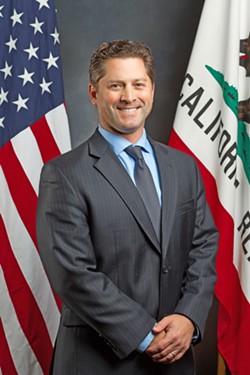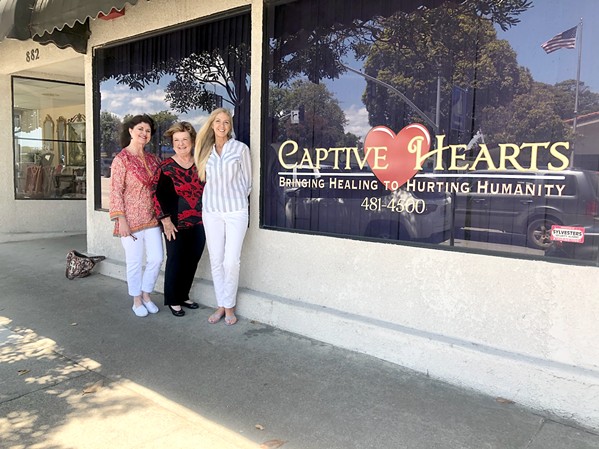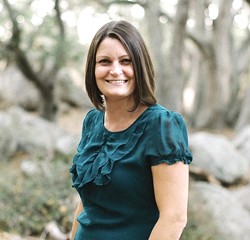On May 22, two people allegedly involved in a sex-trafficking case were sentenced to nearly a year in San Luis Obispo County Jail after pleading no contest in April to a felony kidnapping.
Nikko Anaya, 20, and Brianna Morales, 24, were among four co-defendants—the other two were Fabio Silveira and Elijah Wolfson—charged with the human trafficking of a 15-year-old girl. Currently the cases against Silveria and Wolfson have been transferred to San Joaquin and Stanislaus counties.
Human trafficking is modern-day slavery. It involves the use of force, fraud, or coercion to obtain some type of labor or commercial sext act, according to the U.S. Department of Homeland Security.

- Illustration By Alex Zuniga
Traffickers look for people who are susceptible for a variety of reasons, including psychological or emotional vulnerability, economic hardship, lack of a social safety net, natural disasters, or political instability. The trauma caused by the traffickers can be so great that many may not identify themselves as victims or ask for help, even in highly public settings.
According to reports filed by the San Luis Obispo Police Department, the victim from Manteca told investigators that she met Anaya through Instagram and made plans to go on a trip with him to Santa Cruz. The report states that Anaya paid for the victim's meals and, in turn, he said that she owed him. He told her that she would have to have sex with a man for $180.
Anaya then forced the victim to have sex with several men on their way to SLO County—where she was finally able to seek help.
In a separate incident in April, three massage parlors in Atascadero were under investigation for allegedly offering sexual acts for money, according to the Atascadero Police Department.
Over the past several months, the department partnered with the San Luis Obispo Police Department and the SLO County District Attorney's Office's Human Trafficking Task Force to conduct an undercover human-trafficking sting.
On April 10, Atascadero police and the DA's Office's Bureau of Investigation served search warrants at the three businesses, according to the police department, and one person is facing charges for prostitution.
"Due to the nature of the investigation and the alleged acts of prostitution, it was believed that human trafficking could be involved," an Atascadero Police Department press release stated. "Considering this, the Atascadero Police Department requested the assistance of an advocate from the San Luis Obispo County Victim Witness Office during the operation to provide services such as counseling and emergency housing to any identified victims of human trafficking."
The Polaris Project is a national organization that works to combat and prevent modern-day slavery and human trafficking. For the past 10 years, the organization has run the National Human Trafficking Hotline and has worked on about 40,000 cases of trafficking nationwide.
According to a report by Polaris, in 2017, the organization worked on 8,759 cases of human trafficking reported to the national hotline and a textline. The number is only a fraction of incidents of human trafficking, as many aren't reported to the police.
Locally, organizations strive to help victims and survivors with services tailored to each individual as best they can while facing a lack of funding and a shortage of safe housing where victims can recover. State Assemblymember Jordan Cunningham (R-SLO) is working at the state level to amend and create legislation statewide, with a focus on SLO County, to create a funding source that will aid county task forces and their effort to combat human trafficking at the local level.
From the top
When Assemblyman Cunningham was first elected into office in November 2018 he said he looked at the data that states human trafficking is the largest global criminal enterprise.
The International Labor Organization, a United Nations agency, estimates that forced labor and human trafficking represent a $150 billion industry worldwide.
Cunningham said it's constantly growing—and growing faster in California than anywhere else because of its close proximity to South America, where a lot of victims come from. Victims can get taken from the state and across the country.
"I get asked this a lot on the Central Coast, 'Is this really happening here?' The answer is yes. You have no idea how much this is happening here because Highway 101 is becoming a trafficking corridor," he said.
Cunningham has been collaborating with the SLO County Sheriff's Office and the SLO County District Attorney's Office to find out how he can support the two agencies with funding and legislation at the state level so they can dedicate a team of people to go after human trafficking locally.
The county has a human trafficking task force, similar to a gang task force, but it needs funding in order to dedicate a deputy sheriff, a district attorney investigator, and a prosecutor. Cunningham recently requested a specific budget for a rural county designated grant program to fund vertical prosecution teams for human trafficking—an effort he's been working on for years.

- Photo Courtesy Of Jordan Cunningham
- STATE LEVEL In order to combat human trafficking locally, Assemblyman Jordan Cunningham (R-San Luis Obispo) has worked on and continues to create and amend statewide legislation.
"Right now, it's exceedingly hard to designate one or two deputy DAs to full-time trafficking cases because they have so many other things going on, and it's exceptionally hard on a police department without a grant program to fund vertical prosecution teams," Cunningham said. "In this model, you would have a designated prosecutor working hand-in-glove with a designated team of victim advocates and counselors, build a rapport with them over time, do sting operations, take down trafficking rings, and build a rapport with victims."
Human trafficking is an issue that's hard to address anywhere because it's mobile. Cunningham said that in some cases, "Johns"—individuals who pay for or trade something of value for sexual acts—will look online for prostitution. What they may or may not be aware of, he said, is if you dig deeper, what may look like prostitution is a case of a person who's being exploited locally while their pimp is out of the area.
"['Johns'] like coming to the Central Coast because we have a tourist area, and some of the 'Johns' or the solicitors are often people on vacation or don't live in the area, because they want to do it away from where they live. That makes them think it's somewhere less likely that they'll get caught," Cunningham said. "They don't even necessarily know they're supporting the trafficking trade."
The lawmaker introduced two bills at the beginning of this year—Assembly Bill (AB) 662 and AB 663. AB 662 would give prosecutors another tool to go after those who traffic minors. AB 663 would increase the maximum fines imposed on traffickers and "Johns" and commit up to 75 percent of the money collected toward helping trafficking victims. That 75 percent would stay at the local level and counties could use it explicitly for counseling and rehabilitation services for victims.
"Right now, the funding source comes out of the State Crime Victims Compensation fund, but that fund is heading toward insolvency and will have to be backed by the general fund, so I wanted to create a stand-alone thing that can be administered at the county level," Cunningham said.
It happens here
The SLO County District Attorney's Office established the SLO County Anti-Human-Trafficking Task Force in 2014. The task force is made up of roughly 30 government agencies and private organizations that work together to identify trends, effects, and resources that are necessary to fight human trafficking.
The Victim Witness Assistance Center in SLO is part of that effort. The center works to reduce the trauma, frustration, and inconvenience experienced by victims, witnesses, and family members affected by crime. Beth Raub and Divina Diaz, directors of the center, said the task force was created because law enforcement and county officials were starting to see that human trafficking—labor- or sex-trafficking—was becoming more prevelant in San Luis Obispo County.
Diaz said the Santa Barbara County District Attorney's Office created its task force in 2013, which was the extra push for San Luis Obispo to do the same.
"The big piece I think is the human trafficking task force is a collborative effort. We're all equal parts in this, and we're trying to collaborate together using our resources that we each have to build a net, a safety for these victims coming out, while also keeping the public safe by education and awareness," Raub said.
Raub said the center doesn't have a number of how many cases of human, sex, or labor trafficking they've worked on. But they do have the number of cases that have been filed: 13 since 2014. Before 2014, she said, no one really tracked the cases or filed them.
"Filed means law enforcement arrested somebody for human trafficking, the report came to the District Attorney's Office, and then the district attorney or the filing deputy district attorney filed a case of human trafficking, and we prosecuted that person," Raub said.
Once Victim Witness gets involved with assisting the survivor, it calls several different organizations to see which one is able to provide clothing, hygiene products, food, and transportation—a short list among the many comprehensive services that a survivor might need.
The only insurmountable issue Raub and Diaz encounter is locating a safe house for survivors to stay in while they recover. There are many times, Raub said, that they'll have to send human trafficking survivors out of the county in order for them to be in a safe location. There aren't any such places strictly for human trafficking victims in San Luis Obispo County.
"Not only does it displace them, but if a human trafficking victim were to be kept in a hotel for safety, they could have been put in a hotel and traumatized in a hotel. So I would say there's not enough resources," Raub said. "Our nonprofit partners are working on that and are part of the housing committee trying to get those aftercare resources together, but they need support from the community."
Local effort
It's hard to miss Captive Hearts. Its storefront on Grand Avenue in Grover Beach has a large heart with its name written in yellowish-gold lettering.
Captive Hearts is a nonprofit that facilitates a six-month to one-year faith-based recovery program that provides psycho-education, trauma and grief recovery, coping skills, counseling, and accountability.

- Photo Courtesy Of Captive Hearts
- SAFE PLACE Judy Boen's (center) vision of creating a safe home to facilitate a six-month recovery program for individuals with a history of substance abuse came to life with the help of Cyd Sebring (right) and LeeAnn Smith (left).
Judy Boen, founder of Captive Hearts and chaplain at the San Luis Obispo County Women's Jail, had a vision about a place where she could help women similar to those she met at the jail. Boen said the individuals who were incarcerated and eventually got out would often reoffend because there weren't any services that could help them rehabilitate back into society.
With the help of her daughter, Boen created Captive Hearts, which started in an office that provided counseling, lunch, and help with accessing other resources. In 2010, Cyd Sebring and LeeAnn Smith became the nonprofit's program directors and started running the recovery program. Smith said it provides individual counseling with licensed drug and alcohol counselors, psycho-educational groups (relapse prevention, seeking safety, grief recovery, anger management, healthy boundary seeking, helping women recover, breaking free, and loving yourself), equine therapy, a computer room so clients can work on résumés or online classes to get their General Education Development certification, and a bed in one of the program's two homes.
Sebring said this program differs from other sober-living programs because it can provide all of these services on top of scheduled appointments with case workers, and the environment eliminates outside factors that could distract clients from the recovery process.
"So it's really about dialing down or minimizing all these other things that are pulling in their attention for six months of their life, and they can focus on what they need to heal," Sebring said.
Smith said that aside from the recovery care and services, it's important that their clients feel comfortable throughout the program and in the recovery homes.
"Once they've completed the program, they know this is a safe place to come back to if needed. I mean, we still have people that have graduated and still come back to visit or come back because they've relapsed," Smith said. "Relapse is unfortunately a part of this disease, so we do as much as we can to eliminate the shame because they've gained so much ground while they were here, so they can at least be in a better place than where they were the first time."
Part of the population Captive Hearts works with are survivors of human trafficking.
"We work with agencies that work directly with those survivors, and most of them usually have been taking enough drugs that they're usually addicted," Sebring said.
The Central Coast Freedom Network is another organization that aids survivors of human trafficking. The nonprofit started in 2012 as a faith-based organization called Mountainbrook Abolitionists through Mountainbrook Community Church in San Luis Obispo. It was the first nonprofit on the Central Coast to address human trafficking. A growing demand for the organization's services led the group to officially incorporate into Central Coast Freedom Network in 2015.

- Photo Courtesy Of Central Coast Freedom Network
- GIVING BACK CHOICE Coleen Buckely, executive director of the Central Coast Freedom Network, said her organization focuses on giving back a human trafficking survivor's right to choose what they want to do after leaving or fleeing their situation.
Executive Director Coleen Buckely said the network promotes awareness and educates the community, works with different agency partners, and provides a state-mandated, 40-hour human trafficking advocacy training.
"I believe we're the third in the state to deliver that, and we're still delivering that now, and so that kind of mandates if someone would like to become an advocate and work with a survivor, they would need to take that training, which is kind of the first step in the process," Buckely said.
The organization is also revamping its advocate program to readily assist with emergency response for someone who is just coming out of their situation, through something like a bust. In a more immediate scenario such as that, the victim will have pressing needs.
Freedom Network also provides supportive case management services, which are for individuals who may not have left their trafficker yet, but they have an immediate need for housing, employment, or something that's going to prevent them from re-entering that situation in the future. Buckely said they provide this service because leaving a trafficker and returning could become a cycle for a victim.
The network also works on comprehensive case management, which is an assessment of the survivors' needs and promotes growth over time by using an empowerment model.
"I think that some of the folks that we provide services for are also receiving services from other places in the community, and their feedback has been there are a lot of things that are triggering coming out of this, one of those being choice," she said.
Buckley said a lot of other organizations or people working in the field have this mentality of "I'm rescuing," but that's not Central Coast Freedom Network's philosophy at all. She said she thinks it's law enforcement's job to rescue and save in that moment, but once the survivor is out and wanting to make that change, they are the driver behind the wheel.
"The thing that's been exploited most is their choice, and so when someone comes out of that, as you can imagine, it's not inherent, so it's rebuilding that," Buckley said. "They're the expert in their life, not us, and so they need to really drive the bus, and we need to listen more than sit there and try to save or help." Δ
Staff writer Karen Garcia can be reached at [email protected].


Comments (3)
Showing 1-3 of 3